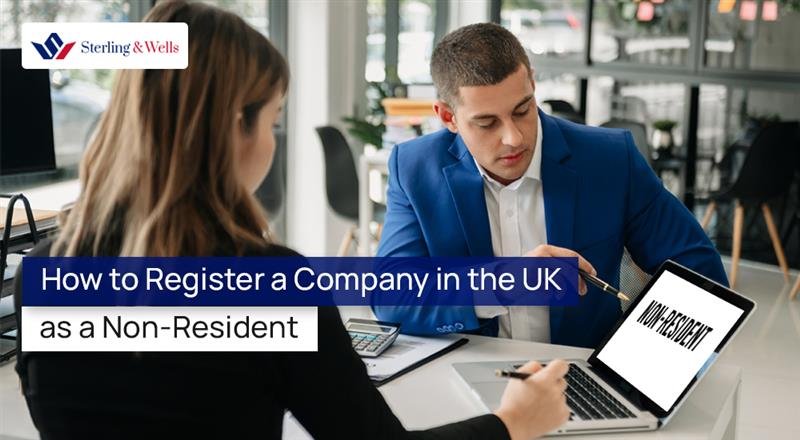How to Set Up a Company in the UK as a Non-Resident

Starting a company in the UK as a non-resident may seem intimidating at first glance. After all, navigating a foreign country’s legal and financial systems can feel overwhelming. However, the process is much more straightforward than many people think, and with the right guidance, you can set up your UK company quite easily.
But first things first, you don’t need to live in the UK, hold a UK passport or even visit the country to set up your business in the country. Everything can be done online from wherever you are. You also don’t need to hire expensive lawyers or consultants for the basics. A little patience (and maybe a friendly formation service) will do the trick.
Steps to Register Your Company
1. Decide What Kind of Company You Want
Most non-residents opt for the “Private Limited Company” or “Ltd” category for their company. Why? Because it keeps your personal money and business money separate. If the business gets into trouble, your own savings are safe. You can be the only owner (director and shareholder) or bring partners on board.
2. Pick a Name for Your Company
Think of something original because your company name needs to be unique in the UK. There’s a free name-checking tool at Companies House. Make sure you like how it sounds, but also that nobody else is using it. This helps you avoid legal headaches and branding confusion later.
3. Get a UK Address Even If You Don’t Live There
Every UK company is required to have a registered office address within the country. Don’t worry, you don’t need to rent an English cottage. There are numerous services that offer a legitimate UK address for a small fee. They’ll forward your mail and you can keep things official without living locally.
4. Appoint Directors & Shareholders
At least one director is a must (this one director can be you), living anywhere in the world. Want to keep things simple? You can be both the only director and the only shareholder. No need for a big team or complicated arrangements.
5. Complete Mandatory Digital Identity Verification
Starting November 18, 2025, every new company director and “Person with Significant Control” must pass an identity check before a company can be registered or a new director appointed. This is a one-time process that can be completed online or through firms registered as Authorised Corporate Service Providers (ACSPs). You’ll get a personal Companies House code once approved. Hang onto it for future filings. If you use a formation agent or accountant, they’ll guide you through the steps.
6. Prepare The Basic Paperwork
You’ll need two documents – a Memorandum of Association and Articles of Association. These sound fancy, but you can download standard templates and fill them out or pay a formation service to sort it for you. Basically, they explain how you’ll run your company and who owns it.
7. Register
While it is technically possible to register a company online through Companies House, navigating the process on your own can be confusing, especially for non-residents. Using a professional service simplifies everything. Experts will handle the paperwork, guide you through legal requirements, and ensure your company is set up correctly the first time. This not only saves you time and stress but also gives you peace of mind knowing your UK company is fully compliant from day one.
Register Your Company With The Right Guidance
Registering a new company in the UK as a non-resident can be full of complications, and the intricacies can make the entire process feel overwhelming. Get expert advice and stay compliant today!
8. Set Up a Business Bank Account
Opening a UK business bank account is essential for smooth operations, but it can be one of the trickiest steps for non-residents. Traditional banks often require in-person appointments, which is not always practical if you’re overseas. This is where professional services make a huge difference. Instead of struggling with restrictions or trying to figure out which online solution works best, experts can help you access reliable business banking options tailored to non-residents. Many formation specialists also have established relationships with banking providers, making the process faster, easier and far less stressful. By working with professionals, you’ll save time and ensure your business finances are set up correctly from day one.
9. Register for Taxes
If your company starts trading (making or spending money), you should register for Corporation Tax with HMRC (the UK tax office) within three months. You might also need to register for VAT if your revenue passes a certain amount (around £90,000 per year). Again, professionals can help, but many formation agents include tax registration as part of their services.
10. Keep Up with the Paperwork
After you’re up and running, your company must file documents such as a confirmation statement and annual accounts with Companies House every year. Even if you do zero business, this is still required. Most formation services offer help with these ongoing filings to keep you compliant and avoid penalties.
What About Fees, Legal Stuff and Practical Tips?
- You only need £1 to start your Ltd company
- You don’t need a UK visa, just a valid ID
- A virtual address will keep your home address private
- Don’t stress if you’re new to UK rules—formation agents exist to guide you through the details
Conclusion
Registering a UK company as a non-resident is only about 10 simple steps. The essentials: pick a name, choose your structure, get a UK address, verify your identity and file online. If you start feeling lost, just come back to this checklist. We will make sure you stay on track and compliant with the newest rules.
Sterling & Wells
We are Sterling & Wells — a UK-based team of accountants and tax advisors helping individuals and businesses stay fully HMRC compliant. From VAT and bookkeeping to self-assessments and tax planning, we’ve got your finances covered.